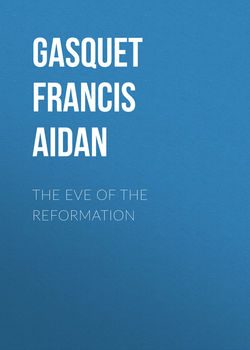The Eve of the Reformation

Реклама. ООО «ЛитРес», ИНН: 7719571260.
Оглавление
Gasquet Francis Aidan. The Eve of the Reformation
CHAPTER I. INTRODUCTION
CHAPTER II. THE REVIVAL OF LETTERS IN ENGLAND
CHAPTER III. THE TWO JURISDICTIONS
CHAPTER IV. ENGLAND AND THE POPE
CHAPTER V. CLERGY AND LAITY
CHAPTER VI. ERASMUS
CHAPTER VII. THE LUTHERAN INVASION
CHAPTER VIII. THE PRINTED ENGLISH BIBLE
CHAPTER IX. TEACHING AND PREACHING
CHAPTER X. PARISH LIFE IN CATHOLIC ENGLAND
CHAPTER XI. PRE-REFORMATION GUILD LIFE
CHAPTER XII. MEDIÆVAL WILLS, CHANTRIES, AND OBITS
CHAPTER XIII. PILGRIMAGES AND RELICS
Отрывок из книги
The story of the English literary revival in the fifteenth and sixteenth centuries is of no little interest and importance. The full history of the movement would form the fitting theme of an entire volume; but the real facts are so contrary to much that is commonly believed about our English renaissance of letters, that some brief account is necessary, if we would rightly understand the attitude of men’s minds on the eve of the Reformation. At the outset, it is useful to recall the limits of this English renaissance. Judged by what is known of the movement in Italy, the land of its origin, the word “renaissance” is usually understood to denote not only the adoption of the learning and intellectual culture of ancient Greece and Rome by the leaders of thought in the Western World during the period in question, but an almost servile following of classical models, the absorption of the pagan spirit and the adoption of pagan modes of expression so fully, as certainly to obscure, if it did not frequently positively obliterate, Christian sentiment and Christian ideals. In this sense, it is pleasing to think, the renaissance was unknown in England. So far, however, as the revival of learning is concerned, England bore its part in, if indeed it may not be said to have been in the forefront of, the movement.
This has, perhaps, hardly been realised as it should be. That the sixteenth century witnessed a remarkable awakening of minds, a broadening of intellectual interests, and a considerable advance in general culture, has long been known and acknowledged. There is little doubt, however, that the date usually assigned both for the dawning of the light and for the time of its full development is altogether too late; whilst the circumstances which fostered the growth of the movement have apparently been commonly misunderstood, and the chief agents in initiating it altogether ignored. The great period of the reawakening would ordinarily be placed without hesitation in post-Reformation times, and writers of all shades of opinion have joined in attributing the revival of English letters to the freedom of minds and hearts purchased by the overthrow of the old ecclesiastical system, and their emancipation from the narrowing and withering effects of mediævalism.
.....
Selling, even after his election to the priorship of Canterbury, continued to occupy a distinguished place both in the political world and in the world of letters. He was chosen, though only the fifth member of the embassy sent by Henry VII. on his accession to the Pope, to act as orator, and in that capacity delivered a Latin oration before the Pope and Cardinals.35
He was also and subsequently sent with others by Henry on an embassy to the French king, in which he also fulfilled the function of spokesman, making what is described as “a most elegant oration.”
.....